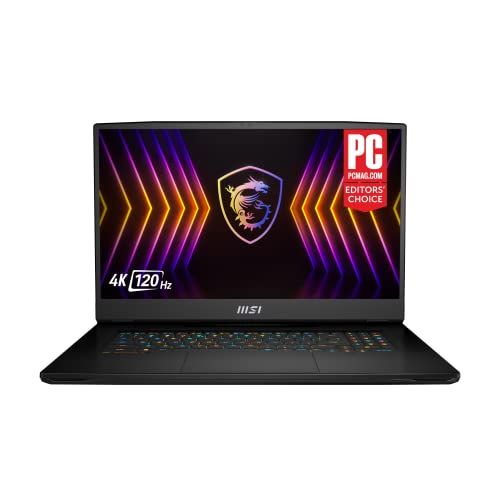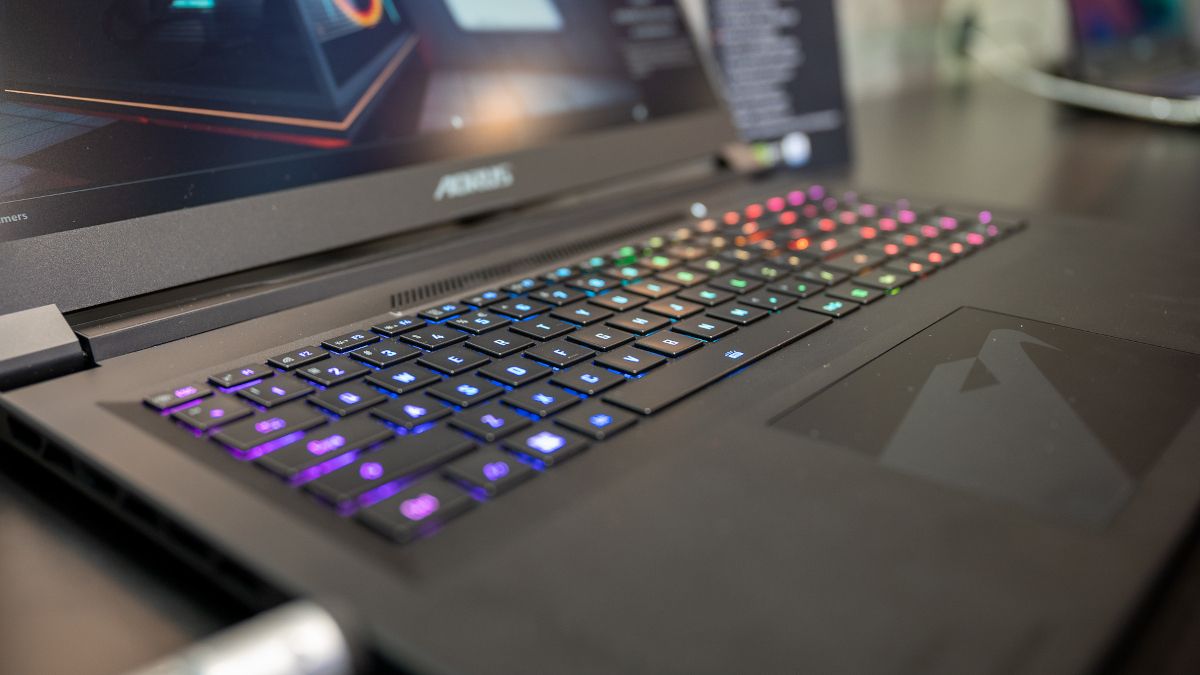Quick Links
You probably know that choosing a gaming laptop over a gaming desktop PC means getting less performance, but how big is that gap exactly? The answer is probably not as large as you think. In fact, it may not matter!
Absolute Performance: Desktop Wins
If you compare the absolute highest-end laptops, such as the MSI Titan GT77, to the best possible desktop PC you can build, the performance gap is enormous.
For example, while the GT77 equipped with a mobile 3080 Ti scores just short of 30,000 in 3DMark Fire Strike, a 3090 Ti desktop system (which you could build for similar money) should score in the mid-50K range on the same test. Clearly, the best desktop PCs beat out the best laptops every time, at least in terms of what they're (theoretically) capable of.

MSI Titan GT77
The ultimate gaming laptop, at least until the next model, the GT77 will crush 99% of gaming desktops in the wild, while slipping easily into a backpack.
Usable Performance: It's a Draw
However, comparing products at the very top of each product category is a little misleading. Most PC gamers never buy these products or need anywhere near this much performance to play their games at good settings.
Mainstream gaming laptops, such as the Razer Blade 15 will easily keep up with current mid-range gaming PCs. The 3070 Ti model offers very similar performance to the desktop RTX 3060 Ti in an almost ultrabook form factor.
This changes the framing between gaming laptops and desktops because the desktops most PC gamers actually play on perform no better than a modern gaming laptop.
The "halo" products at the top of the stack (the RTX 4090 being a prime example) don't represent the typical gaming experience for either type of machine. If you buy a decent gaming laptop today, you're not coming in at the low end of desktop gaming PC performance but somewhere between the upper-middle or lower-high end.
Even at the more affordable end of the gaming laptop spectrum, there's plenty of usable performance for reasonable prices. For example, a gaming laptop equipped with a 1080p display and a mobile GTX 1660 Ti will likely equal or outperform an Xbox Series S. Microsoft's budget console offers a satisfying next-gen gaming experience, so there's no reason to look down on laptops will similar gaming chops.
Generational Features: It's a Draw
One of the biggest changes to happen in the gaming laptop world is feature parity between both types of gaming PC. In other words, the CPU and GPU inside your gaming laptop is the same as those of the same generation in desktops. They may run at lower clock speed and power levels, but the actual architecture is the same.
A 30-series RTX GPU in a laptop has the same ray-tracing, AI-upscaling, and pixel shader technology as the desktop variant. This means that the difference is one of raw performance and not of generational feature sets.
Value for Money: It Depends
If you spend the same amount of money on a gaming laptop as a gaming desktop, you'll get more performance from the gaming desktop for that budget. However, you're getting something for that money.
Specifically, you're getting a slim, portable, power-efficient computer that offers a great PC gaming experience. It's all a matter of perspective, so depending on your needs and priorities, a gaming laptop could be more valuable to you than a gaming desktop of the same price.
Another interesting wrinkle in the cost discussion around gaming laptops is the demand for desktop gaming components such as fast CPUs and GPUs. While demand for these parts have inflated their prices dramatically, the relative disinterest from most PC gamers when it comes to gaming laptops have kept their prices reasonable.
This has created a situation where you can buy an entire mobile 3070 Ti gaming laptop for the price of two desktop RTX 3060 Ti GPUs. Of course, the exact price situations may be different when you read this, but it's important to take a sober look at what you're actually getting for your money. Don't assume that every desktop gaming PC will be better value for money than every gaming laptop.
Upgradability: Desktops Win by a Mile
With a few rare exceptions and some failed experiments, the only things you can upgrade on a typical gaming laptop are RAM and storage. If you want a better CPU or GPU, you're almost certainly going to need a new laptop.
This will likely never change, since modular laptops are impractical, and each company designs its own highly-custom laptop chassis and mainboard.
On a desktop PC, you can swap out any part you want. So if you only want to upgrade the CPU or GPU, you can go ahead and simply do it. However, in practice, things aren't quite as simple. Upgrade to a new GPU, and suddenly your CPU is the bottleneck. A new CPU probably needs a new motherboard, which may need new RAM. Now your old SSD is holding you back, or your power supply can't keep up with new demands. In many cases, substantive upgrades to one component can have this domino effect where you end up buying a whole new PC anyway in installments.
So, for some people, buying a new gaming laptop every three to five years may be no different than upgrading their desktop PCs over the same time period.
New Laptop Hardware Is Narrowing the Gap
While desktop gaming PCs remain ahead in performance and probably always will, thanks to their thermal and power budgets, every generation of gaming laptops shrinks that lead. At the time of writing, the 4000-series of NVIDIA laptop GPUs have been announced, and early benchmark leaks suggest that the laptop RTX 4090 might trade blows with the desktop RTX 3090.
Of course, real-world performance in real laptops will differ thanks to decisions about TDP (Thermal Design Power), but to have a mobile GPU that is even remotely in the same league as the previous generation desktop flagship is already impressive, if true. It also suggests that even the entry-level next-generation laptops will leave consoles like the PlayStation 5 and Xbox Series X firmly in the dust, promising excellent value when playing cross-platform games.

